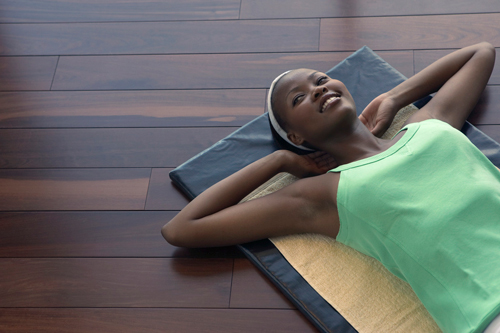Anxiety easily becomes a lifestyle when your body and mind see threat and danger everywhere. What do you do then? Learn to live in The Worry Zone, or develop daily practices to rewire your body and brain. I spoke with licensed clinical social worker Guy Oberwise for some tips on how to reduce anxiety naturally.
First, can anxiety and its more serious disorders be overcome?
Like panic disorder, generalized anxiety disorder, and PTSD, anxiety is very treatable. If you’re able to take a look at what’s going on in the mind and body, there are lots of good techniques you can use to help lower anxiety. The key is that the body has to be trained and the mind focused.
The body can be such a powerful source of information. When you talk about helping the body readjust, how can we help the body do that?
The key word that comes to my mind is practice. If you’ve been hyperanxious for a long time, you can’t just dabble in diaphragmatic breathing for a week. It takes time for your body to learn what it means to breathe deeply. Ideally, you want to practice anxiety-reduction processes three times a day: morning, afternoon, and evening. And you want to do them when you’re in a calm moment so that later, when there’s real stress, your body is already adept at regulating itself.
What are some holistic processes we can put into practice to reduce anxiety?
Everything begins by looking at things you can control. Rather than medication, what can you do naturally to lower anxiety? You need to get a good baseline: What are you doing with your sleep, nutrition, and exercise? Right away you can start adjusting for seven to eight hours of sleep and the elimination of sugary and caffeinated drinks. Then, add in:
- Diaphragmatic Breathing: The object is to breathe deeply from your diaphragm, not shallowly from your chest cavity. Imagine a red balloon filling up with air in your stomach as you’re breathing in, and as you’re breathing out seeing the balloon deflating.
- Progressive muscle relaxation: The focus here is to consciously and deliberately engage your mind and body in a process of release. Starting with the top of your head and working down to your toes, imagine each muscle and body part individually relaxing.
- Mindfulness: The more present you are, the more you control your experience. Take time throughout the day to be aware of what you feel in any moment. Allow those sensations to come up, observe them without judgment, and let them flow through you.
- Meditation: There are many ways to meditate with the goal to calm the mind. We’re all individual, so you have to find what method feels comfortable. Transcendental meditation, a practice that involves focusing on a mantra, is particularly effective for reducing stress and anxiety.
- Dialectical Behavior Therapy Scale: Using a 0 to 5 scale (where 5 equals maximum anxiety), map out how your body feels through the various states of anxiety. Do the same with your mind. Then, build in coping skills for each level, especially 0 to 3. When you start to feel a 2, for example, do some deep breathing. You want to catch the situation before it gets to a 5.
After beginning any of these suggestions, how long does it take to see an improvement?
It depends on how committed you are. If you practice the three-times-per-day rule with any of these processes, you can see some pretty quick results. Maybe not when you’re being triggered, but early on in these techniques you’ll feel better and over time experience benefits in more stressful moments. You’ll see some very nice results, and lower anxiety, if you really commit to the practice in a thirty-day time frame.
Do you have a favorite—and easy!—takeaway exercise that can be used immediately?
Absolutely: Diffusion techniques teach your brain to release a negative focus—for example, letting go of obsessive thoughts. Imagine a freight train going by. One by one, put each thought on the train as it travels past. Continue with all thoughts until you feel distance between yourself and any disturbing ideas.
Post Disclaimer
This content is for informational purposes only and does not constitute medical advice. Please consult a healthcare professional for any medical concerns.




4 Comments
Helen B.
Hello Rewire Me Family! I’m happy to be here 🙂 … I myself have tried Diaphragmatic Breathing, Progressive Muscle Relaxation and Meditation. However, Meditation was hard for me because I could never stay focused for more than 5 minutes, my mind was always racing. The breathing and muscle relaxation worked wonders. If only I could stick with it on a daily basics I would feel great.
Michele Rosenthal
@Helen — Welcome to the Rewire Me family!! As a matter of fact, research has shown that you can receive HUGE benefits from meditating only 5 minutes per day. So, if you can do that…. that’s enough to create major results in reduced anxiety and increased neuroplasticity, which helps you brain create new patterns of calm.
Nora Leach
I will for sure try the “Dialectical Behavior Therapy Scale” for my anxiety which has been through the roof lately.
Thank you for sharing.
Michele Rosenthal
@Nora — I’m so glad you found something new to try. Managing anxiety is so much trial and error. My radio show has many interviews with experts about how to reduce symptoms and reclaim control. The archives are free: http://www.changeyouchoose.com/archives